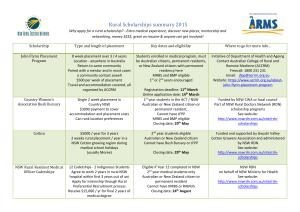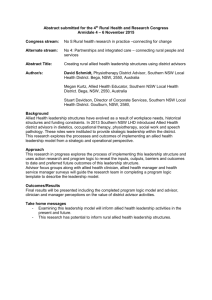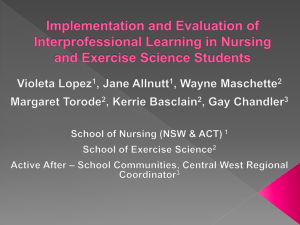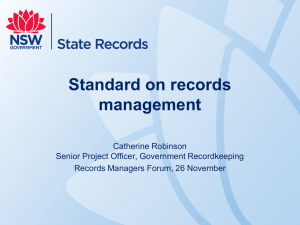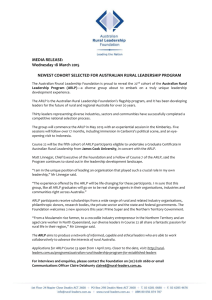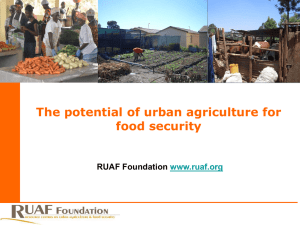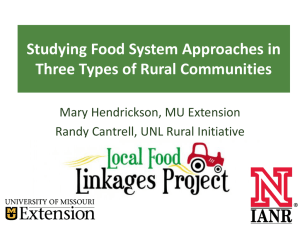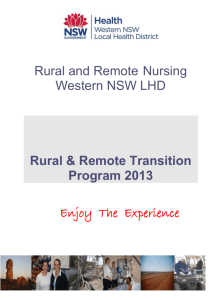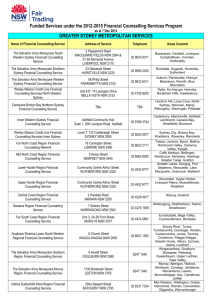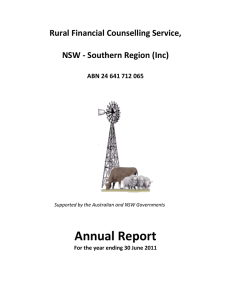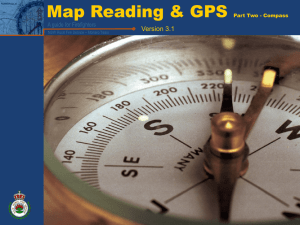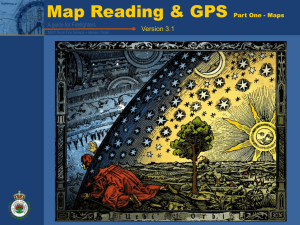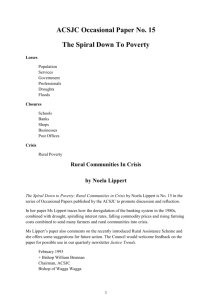Prof Brian Kelly, Newcastle University
advertisement
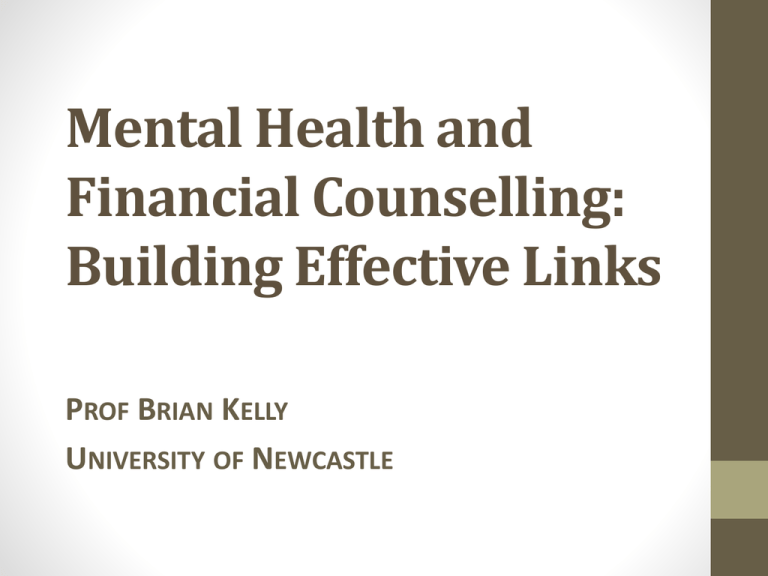
Mental Health and Financial Counselling: Building Effective Links PROF BRIAN KELLY UNIVERSITY OF NEWCASTLE • Rob is a 57 year old farmer living with his wife June on an isolated pastoral property in the north of the state. • Rob had been worried about the financial status of the family property and he has made application recently for financial assistance in response to the drought through “Exceptional Circumstances” assistance. • He has been talking with a rural financial counsellor, and recently with his bank manager about the property increasing debt level. • His marriage has been under some strain for some time. June is now worried about Rob – he doesn’t get of the farm very often, and spends more and more of his time on his own on the property. • He is drinking more than usual, and appears to have lost interest in the property and his usual social activities. He has trouble concentrating, difficulty making decisions, and has been avoiding the “pile of accounts” – “its all too much bad news”. • A friend of Rob and June’s (a fellow farmer in the district) died by suicide 6 months ago and June is becoming worried about how Rob is coping. • Financial Hardship and Mental Health • Evidence from rural sector • Model of partnerships/linkages between mental health and financial sector • Challenges • Impact of financial strain on mental health of individuals and families • Impact of mental health problems on skills to manage financial adversity • Rural financial counsellors: • Assisting people to adapt to realities of financial situation • High level of mental health need among clients • first points of referral contact in primary mental health care • Window of opportunity for intervention •Local •Accessible •Knowledge of available assistance •Little embarrassment associated with use RFCs provide a unique blend of general counselling in addition to financial counselling. While this can fill a social and emotional void … many Counsellors are not trained in this field (Acknowledgement: Prof J Fuller, Flinders University) To improve referrals 59% thought referrals could be improved F ig u re 2 . S tra te g ie s to im p ro v e re fe rra ls mor e s er v ic e in my r egion f or mal r ef er r al pr oc es s betw een or ganis ations netw or k w ith mental health/ other c ouns ellor s r ef er r al guide tr aining 0 10 20 30 40 50 n u m b e r ( 3 r es pons es /c ouns ellor n=68) (Fuller and Broadbent, Aust J Rural Health 2006) Building Service Collaboration to Support Early Identification and Intervention for Mental Health Problems • 112 agencies from 149 identified (75%) completed a telephone-based survey. • 70% indicated that two thirds of their clients were in need of assistance for mental health related problems. • Agricultural support sector rated links with the health sector as less effective than did the health sector (p<.05). • The most highly linked agency across all towns across all mental health exchanges came from agricultural support (rural financial counselor), (Fuller J, Kelly B,et al, BMC Health Services Research 2009) 9 Funded by Australian Rotary Health Research Fund NSW Farmers Mental Health Network • BLUEPRINT – 22 Key Action Areas Pathways to Breakdown External Factors Isolation / loneliness Alcohol misuse Family Breakdown Suicide Pathways to Health Advocacy for Farm Support Building Social Networks Raise Awareness = Reduce Stigma Access to Counselling Mental Health First Aid Training NSW Farmers Mental Health Network Farmers mental health – collaborating organisations • • • • • • • • • • NSW Farmers Association MH Network Anglicare Australian Centre for Agricultural Health and Safety Australian Rotary Health Research Fund beyondblue Black Dog Institute Centre for Mental Health Research, Australian National University Centrelink Centre for Social Research, Charles Sturt University Country Women’s Association of NSW • • • • • • • • • Department of Primary Industries: Drought Support Workers NSW Association of Rural Financial Counselling Groups NSW Farmers’ Association Presentation Sisters Rural Outreach Service Rural Doctors Association of Australia St Vincent de Paul Society Suicide Safety Network Salvation Army Wesley Life Counselling/LifeForce 12 • Building confidence and capacity – Mental Health First Aid Training • Building collaboration between local services across health, welfare and financial support sectors Local Mental Health Networks • Planning workshops with wide range of agencies • Banks, accountants, RFCs • Vets, stock and station agents • GPs, community nurses • Mental health services • What are the needs? • what resources do we have? • What are our experiences and roles? • How can we work effectively together? Challenges • Financial Sector • Confidence in knowing what to say and/or do • Role definition ..”but I am not a counsellor” • Understanding roles and pathways through health system • Personal strain of the role • Health sector • Confidence in working with sectors outside health • Understanding of roles of workers in financial sector • Less accustomed to considering the importance of this “first contact” role Mental health help is wider than mental health services • Local helpers will be used as first points of contact • Local helpers are best included in the local system • Inclusion by networks, training and protocols (guide)
